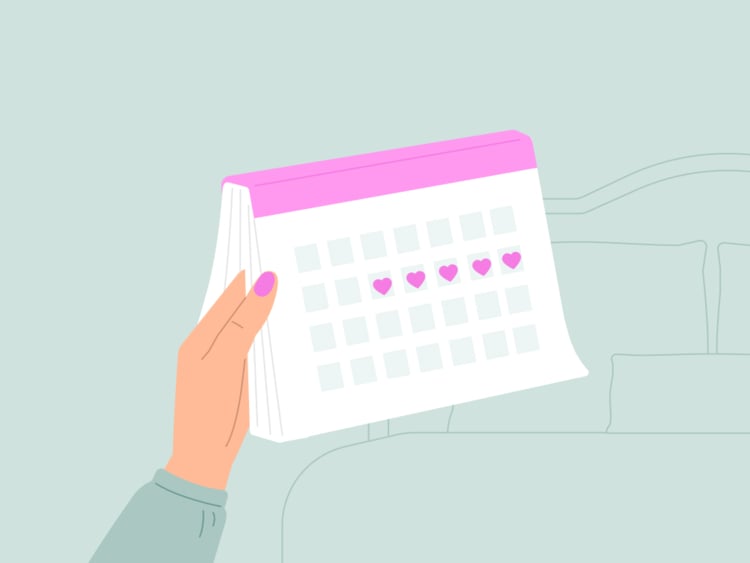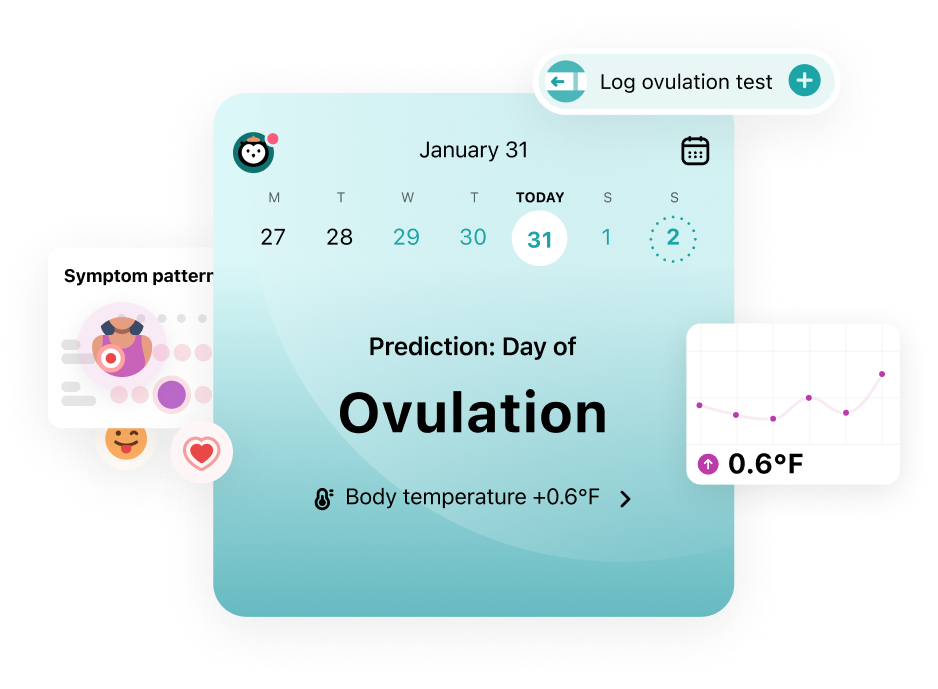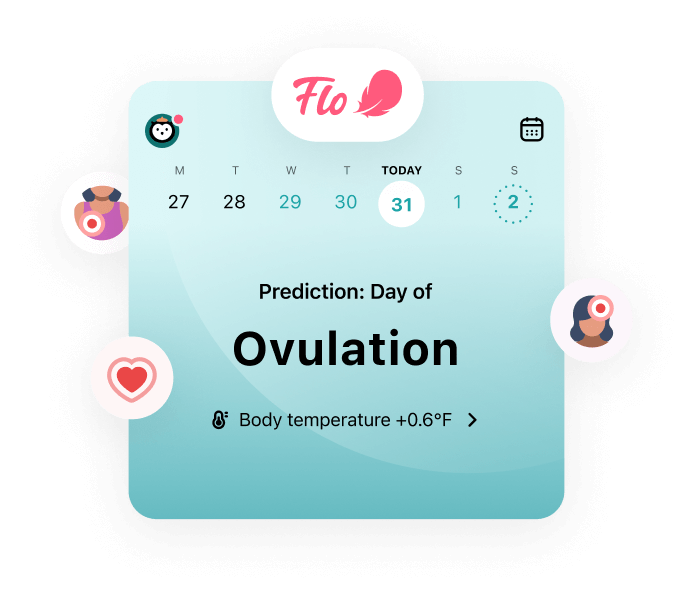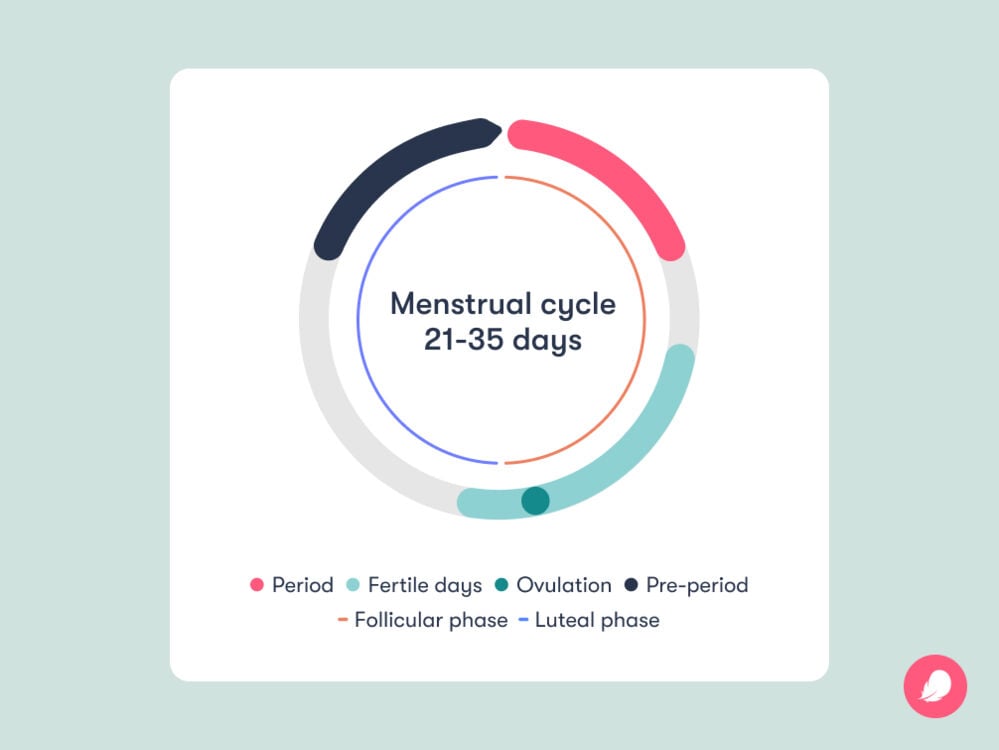Your chances of getting pregnant can change throughout your cycle. Learn more about why, when to have sex to conceive, and other ways to boost your chance.
-
Tracking cycle
-
Getting pregnant
-
Pregnancy
-
Help Center
-
Flo for Partners
-
Anonymous Mode
-
Flo app reviews
-
Flo Premium New
-
Secret Chats New
-
Symptom Checker New
-
Your cycle
-
Health 360°
-
Getting pregnant
-
Pregnancy
-
Being a mom
-
LGBTQ+
-
Quizzes
-
Ovulation calculator
-
hCG calculator
-
Pregnancy test calculator
-
Menstrual cycle calculator
-
Period calculator
-
Implantation calculator
-
Pregnancy weeks to months calculator
-
Pregnancy due date calculator
-
IVF and FET due date calculator
-
Due date calculator by ultrasound
-
Medical Affairs
-
Science & Research
-
Pass It On Project New
-
Privacy Portal
-
Press Center
-
Flo Accuracy
-
Careers
-
Contact Us
When to have sex to conceive: Your simple guide to ovulation tracking


Every piece of content at Flo Health adheres to the highest editorial standards for language, style, and medical accuracy. To learn what we do to deliver the best health and lifestyle insights to you, check out our content review principles.
Growing up, a lot of us were taught that you can get pregnant at any point in your cycle — which is true, technically. But it’s a lot more likely at some times than others. This is why, if you’re trying to get pregnant, being strategic about when you have sex is key.
“It may sound basic, but pregnancy only happens when a sperm fertilizes an egg. And women only ovulate, or release an egg, once during each cycle. And after it’s been released, the egg can only live for 24 hours!” says obstetrician and gynecologist Dr. Jennifer Boyle, Massachusetts General Hospital, US. “So when we talk about trying for pregnancy, it always comes back to the ‘fertile window.’”
Maybe the “fertile window” sounds familiar to you. Maybe it doesn’t. Either way, we’re about to reveal all. With Dr. Boyle’s help, we’re talking about when to have conception sex, how often to do it, and what else you need to know about getting pregnant.
Key takeaways
- The best time to have sex to conceive is in the five days leading up to ovulation (when your ovary releases the egg), the day of ovulation, and the day after ovulation. This is what we call your “fertile window.”
- While ovulation generally occurs mid-cycle if you have an average 28-day cycle, the exact day differs for everyone. So, it’s a good idea to use a tracking method that can predict when it will be — such as a pregnancy-tracking app like Flo, ovulation test kits, or monitoring your cervical mucus.
- You don’t have to have sex every day in your fertile window to maximize your chances of getting pregnant (although you can if you want to). Having sex every other day is just as good.
- Flo is on hand to support your conception journey every step of the way.

 Over
7.8M
ratings averaging
4.8/5
*
Over
7.8M
ratings averaging
4.8/5
*
Understand your fertility better with the Flo app
- Learn more about your fertility signals
- Improve ovulation predictions by tracking temperature via Apple Watch
- Log your ovulation test results
 Over
7.8M
ratings averaging
4.8/5
*
Over
7.8M
ratings averaging
4.8/5
*

Trying to conceive?
The Flo app can help you better understand your fertility

 Over
7.8M
ratings averaging
4.8/5
*
Over
7.8M
ratings averaging
4.8/5
*
Understand your fertility better with the Flo app
- Learn more about your fertility signals
- Improve ovulation predictions by tracking temperature via Apple Watch
- Log your ovulation test results
Take a quiz
Find out what you can do with our Health Assistant
When should you have sex to conceive?
The fertile window describes the five days leading up to ovulation (when your ovary releases an egg), the day of ovulation, and the day after ovulation. These are the days of your cycle at which you’re most fertile. The egg itself only lives for up to 24 hours, but sperm can live inside your body for up to five days. This is why your fertile window starts five days before you’ve actually ovulated.
“Studies show that people have the highest chance of becoming pregnant when they have sex the day before ovulation and the day of,” says Dr. Boyle. But the entire fertile window is a great time to be having sex.
Broadly speaking, ovulation occurs midway through your cycle (so, if you have a 28-day cycle, then on average, it would occur on day 14). However, the exact day can vary depending on the length of your cycle and other factors. So, how do you know when it’s going to happen for you?
Read on to find out.
Understanding your menstrual cycle
Before we dive into ovulation tracking, let’s back up. To understand how high or low your chance of pregnancy is at any given time, it helps to understand the whole menstrual cycle.
The menstrual cycle is your body’s way of preparing for pregnancy each month, driven by a series of hormone fluctuations that trigger the necessary changes in our bodies. Ready for a little crash course?
Follicular phase
The follicular phase is the first part of your cycle and starts on the first day of menstruation. Your chance of getting pregnant during your period is low, but it increases as the follicular phase progresses (because you’re getting closer to ovulation).
Your period will typically last two to seven days, but the whole follicular phase lasts, on average, 14 to 21 days. At this time, your ovary is preparing a new egg for release.
Ovulation
Ovulation isn’t classed as a phase of the menstrual cycle since it’s actually just a moment in time. But, as we know, it’s a pretty big deal: It’s when your ovary releases the egg into your fallopian tube, where it will live for around 24 hours, and when your chance of pregnancy is highest.

Luteal phase
The luteal phase begins after ovulation and runs until the day of your next period (when the whole cycle starts again). Aside from the first couple of days after ovulation, the chance of getting pregnant is low in the luteal phase.
During this time, your uterine lining is thickening to prepare for a possible pregnancy in case your egg was fertilized by any sperm — which, if it wasn’t, will shed with your next period.
How often do you need to have sex during your fertile window?
Spoiler: It doesn’t have to be every day!
Of course, if you want to have sex every day, go for it. But when it comes to your chances of conceiving, “having sex every other day during the fertile window is just as good as every day,” says Dr. Boyle.
“It doesn’t necessarily help to have sex more than once a day, either. In fact, this may decrease sperm concentration in the man’s ejaculate.” So, to sum up, the sweet spot is once a day, every day or every other day.
That said, go easy on yourself, and try to avoid heaping too much pressure on all the time. You might not be in the mood for sex, or perhaps your fertile window is falling on a busy or stressful week. In this case, Dr. Boyle recommends prioritizing the day before ovulation and the day of, as “these days have the highest chance of success.” And if you aren’t in the mood for sex at all, then don’t feel pressured to do anything you don’t want to do.
How to know if you’re ovulating
There are a few different ways to track ovulation. No method is 100% accurate because bodies don’t operate like clockwork. For this reason, in order to feel more confident, some folks like to use more than one tracking method at once.
But, as Dr. Boyle says, “Everyone’s different, and people should choose what seems right for them.” So, let’s run through the options.
Use an ovulation-tracking app
With an ovulation-tracking app like Flo, all you need to do is log your period dates each month and let us do the rest. We’ll predict your ovulation and fertile window dates for every cycle based on your personal health data and offer a whole host of other tricks and tips for getting pregnant along the way.
Monitor basal body temperature
Your basal body temperature (BBT) is your body’s temperature at rest. Ovulation can cause a slight increase in BBT. So by tracking when that temperature increase kicks in over several months (and logging it somewhere, like in an app or a chart), the idea is that you can start to identify a pattern of when you ovulate — and then use that information to predict it ahead of time for future cycles.
It’s not Dr. Boyle’s favorite method because it’s fiddly and time-consuming. That said, if it helps you feel more in control to use this method alongside others, there’s no harm in it.
You’ll need a special basal thermometer to do it, which you can buy from most drugstores.
Check your cervical mucus
Cervical mucus exits your body as vaginal discharge. One to two days before ovulation, it becomes clear and stretchy, like raw egg whites, to make it easier for sperm to swim up your vagina. Watching for this kind of “egg white” discharge can help you know when you’re about to ovulate.
You’ll often just see it in your underwear or on toilet tissue. But if you want to check with your hands, have a feel around your vulva or check your cervix by inserting a (clean) finger up through your vagina. Get some of this fluid between your thumb and index finger and see if it stretches (as opposed to just breaking).
Checking your cervical mucus is one of the most reliable ways to detect ovulation. Plus, “It’s great because it empowers people to know their bodies and to let their bodies guide them,” says Dr. Boyle. “And it’s free!”
Try an ovulation test kit
A rise in your body’s luteinizing hormone (LH) signals your ovary to release an egg (in other words, it triggers ovulation). So, ovulation tests — which are sticks that you pee on — look for higher traces of this hormone in your urine. These tests can be bought from most drugstores, and you can do them at home.
You may need to test for several days to detect a surge in LH. When you should start testing depends on the length of your cycle, but generally, it’s advised to start three to five days prior to the expected date of ovulation. It’s important to remember that every brand of ovulation test can work slightly differently, so read the instructions. It can be best to take an ovulation test first thing in the morning as that’s when your urine is most concentrated. That’s when it’s more likely that the test will pick up LH.
A positive result means you should ovulate in the next 24 to 36 hours. Learn more about ovulation tests here.
What else you should know about getting pregnant
Try to look for ways to keep conception sex fresh and fun so that it doesn’t feel like a chore for that one week each month. New positions, outfits, toys, you name it — novelty and variety are your friends!
Healthy lifestyle choices can also increase the likelihood of conception. That means maintaining a healthy weight, limiting alcohol and cigarettes, and getting a balanced diet (which are all good things to do anyway). And it’s a good idea to chat with a health care professional about any other ways you can boost your chances, too, especially if you have concerns about infertility.
But ultimately, as Dr. Boyle says, “Trying for pregnancy is a process that you can’t entirely control, and things we can’t control can be stressful.” So it’s important to be kind to yourself and patient with your body along the way.
Learn more about when to take a pregnancy test. And download Flo for support with every step of your conception journey.
More frequently asked questions about when to have sex to conceive
How long should sex last to conceive?
The duration of the sex doesn’t matter. As long as it involves your partner’s penis ejaculating either in your vagina or even around your vulva and vaginal opening and falls within the fertile window, you’re ticking all the right boxes.
Which are the best days of your cycle to have sex for conception?
The best time to have sex for conception is the day before ovulation and the day of, but the whole fertile window (which includes the five days leading up to ovulation, the day of, and the day after) is a great time for it, too.
Ovulation generally happens mid-cycle if you have an average 28-day cycle, but the exact cycle day varies for everyone. You can track and predict when it’ll happen for you via methods like cycle-tracking apps, ovulation test kits, or monitoring your cervical mucus.


Hey, I'm Anique
I started using Flo app to track my period and ovulation because we wanted to have a baby.


The Flo app helped me learn about my body and spot ovulation signs during our conception journey.


I vividly
remember the day
that we switched
Flo into
Pregnancy Mode — it was
such a special
moment.
Real stories, real results
Learn how the Flo app became an amazing cheerleader for us on our conception journey.
References
“Basal Body Temperature for Natural Family Planning.” Mayo Clinic, 10 Feb. 2023, www.mayoclinic.org/tests-procedures/basal-body-temperature/about/pac-20393026.
Bilian, Xiao, et al. “Conception Probabilities at Different Days of Menstrual Cycle in Chinese Women.” Fertility and Sterility, vol. 94, no. 4, Sep. 2010, pp. 1208–11, DOI: 10.1016/j.fertnstert.2009.05.054.
“Calculating Your Monthly Fertility Window.” Johns Hopkins Medicine, www.hopkinsmedicine.org/health/wellness-and-prevention/calculating-your-monthly-fertility-window. Accessed 30 Oct. 2024.
“Cervical Mucus.” Cleveland Clinic, my.clevelandclinic.org/health/body/21957-cervical-mucus. Accessed 30 Oct. 2024.
“Cervix.” Cleveland Clinic, my.clevelandclinic.org/health/body/23279-cervix. Accessed 30 Oct. 2024.
Dunson, D. B., et al. “Day-Specific Probabilities of Clinical Pregnancy Based on Two Studies with Imperfect Measures of Ovulation.” Human Reproduction, vol. 14, no. 7, July 1999, pp. 1835–39, doi:10.1093/humrep/14.7.1835.
“Follicular Phase.” Cleveland Clinic, my.clevelandclinic.org/health/body/23953-follicular-phase. Accessed 30 Oct. 2024.
“How to Get Pregnant.” Mayo Clinic, 30 Oct. 2024, www.mayoclinic.org/healthy-lifestyle/getting-pregnant/in-depth/how-to-get-pregnant/art-20047611.
“Luteal Phase.” Cleveland Clinic, my.clevelandclinic.org/health/articles/24417-luteal-phase. Accessed 30 Oct. 2024.
“Menstrual Cycle.” Cleveland Clinic, my.clevelandclinic.org/health/articles/10132-menstrual-cycle. Accessed 30 Oct. 2024.
“Ovulation.” Cleveland Clinic, my.clevelandclinic.org/health/articles/23439-ovulation. Accessed 30 Oct. 2024.
“Ovulation Home Test.” MedlinePlus, medlineplus.gov/ency/article/007062.htm. Accessed 30 Oct. 2024.
“What Ovulation Signs Can I Watch for if I Want to Get Pregnant?” Mayo Clinic, 9 July 2024, www.mayoclinic.org/healthy-lifestyle/getting-pregnant/expert-answers/ovulation-signs/faq-20058000.
“How Long Do Sperm Live after Ejaculation?” Mayo Clinic, 5 May 2022, www.mayoclinic.org/healthy-lifestyle/getting-pregnant/expert-answers/pregnancy/faq-20058504.
Witt, Barry.“Trying to Get Pregnant? Here’s When to Have Sex.” The American College of Obstetricians and Gynecologists, Aug. 2023, www.acog.org/womens-health/experts-and-stories/the-latest/trying-to-get-pregnant-heres-when-to-have-sex.
“Trying to Get Pregnant.” NHS, www.nhs.uk/pregnancy/trying-for-a-baby/trying-to-get-pregnant/. Accessed 30 Oct. 2024.
Wilcox, A. J., et al. “The Timing of the ‘Fertile Window’ in the Menstrual Cycle: Day Specific Estimates from a Prospective Study.” BMJ, vol. 321, Nov. 2000, pp. 1259–62.
History of updates
Current version (19 December 2024)
Published (19 December 2024)
In this article

Get your personal guide to fertility
-
Learn how to read your body's ovulation signals
-
Find daily conception tips from our experts
-
Chat with others who are trying to get pregnant




